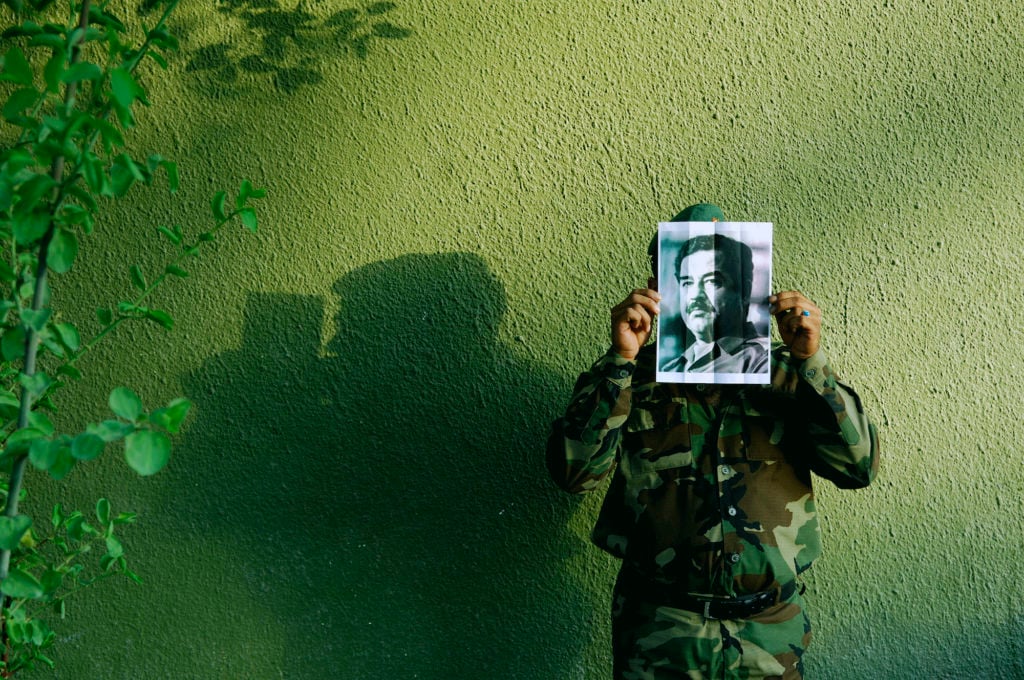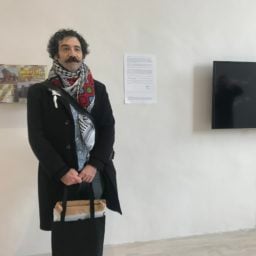Forty-five US military veterans who served in Iraq, Kuwait, and in other theaters around the world have sent a letter to the Museum of Modern Art asking it to reject funding from “toxic” sources.
“We take responsibility for our past actions and as such choose to stand in solidarity with Iraqi artists and all activists calling on MoMA PS1 to ‘take a truly radical position by divesting from any trustees and sources of funding that profit from the suffering of others.’”
The letter was sent in solidarity with the three dozen artists currently showing in “Theater of Operations: The Gulf Wars 1991–2011” at MoMA PS1, who sent their own letter asking the institution to cut ties with controversial board members. Among the people who signed that letter were Mona Hatoum, Jon Kessler, Laura Poitras, Michael Rakowitz, and Martha Rosler.
February 3, 2020
Dear Directors and Trustees of MoMA PS1 and MoMA,
We, veterans of the U.S. military, write this letter in support of the 37 artists featured in Theater of Operations: The Gulf Wars 1991 – 2011, calling for chairman of MoMA’s board of trustees, Leon Black, to divest from defense contractor Constellis Holdings, formerly Blackwater. These artists have put their careers and reputations on the line in calling for Black to divest, while simultaneously demanding a realignment of values at MoMA (and, by extension, all cultural institutions). Following their example, we, the undersigned, call on all veterans—especially those who deployed to Iraq between 1991 and 2011—to support their campaign. MoMA claims a longtime commitment to veterans and service members. Accordingly, we are confident the board members will seriously consider our collective call for divestment.
As veterans of the Gulf War and the “Global War on Terror,” as well as working artists ourselves, this issue is very important to us. We acknowledge our own role in creating the conditions for ongoing death and turmoil in Iraq, and we continue to grapple with this reality through our art, activism, and lives. We take responsibility for our past actions and as such choose to stand in solidarity with Iraqi artists and all activists calling on MoMA PS1 to “take a truly radical position by divesting from any trustees and sources of funding that profit from the suffering of others.” Instead of accepting our current state of endless war and militarism, we follow in the footsteps of other military veterans who have resisted and denounced war through their art, such as Guillaume Apollinaire, Leon Golub, Black Panther Malik Edwards, and the artists of Vietnam Veterans Against the War.
Defense contractors, like Constellis, have profited greatly from the coercive exploitation of Iraqis, while operating under the aegis of the U.S. military, using service members as disposable labor and marketing props. The undersigned have witnessed firsthand the destruction and wastefulness of U.S. wars of aggression, the failed “Global War on Terror,” and the parasitic, profit-driven motivations of defense contractors (especially the notoriously violent Blackwater), which have nothing to do with freedom and democracy.
We also support the MoMA/BlackRock Divest campaign. MoMA board member Larry Fink is CEO of BlackRock, which invests in private prison companies. Such companies represent a domestic war against people of color and the poor. War and prison profiteering are intimately connected. The rampant privatization of the military and the prison system epitomize U.S. militarism, prioritizing the profits of the few who make billions from war, tactical equipment, and mass incarceration, over the health, education, and well-being of the many.
If MoMA truly celebrates “creativity, openness, tolerance and generosity,” as stated in its mission, MoMA will recognize the hypocrisy in displaying the work of dispossessed peoples—Iraqis in this case—while continuing to profit, if indirectly, from the bloodshed and misery of those very people. Such “toxic philanthropy,” as Michael Rakowitz has called it, must end if we are to make the deep changes necessary to address issues like endless war, climate change, poverty, and racism. The successful 2019 campaign calling for the resignation of the Whitney Museum’s former vice chairman Warren Kanders, CEO of Safariland, a company that manufactures tear gas and other weapons (and uses veterans and service members as marketing props), demonstrates that major cultural institutions will respond justly if enough people speak up. Accordingly, we are confident that MoMA will divest, and realign its values by extricating itself from all toxic philanthropy.
Most sincerely,
Aaron Hughes (U.S. Army (ILNG), Kuwait & Iraq 2003–04)
Kevin Basl (U.S. Army, Iraq 2005; 2007–08)
Amber Hoy (U.S. Army, Iraq 2006–07)
Carlos Sirah (U.S. Army, Iraq 2003–04; 2004–05)
Drew Cameron (U.S. Army, Iraq 2003)
Essam Attia (U. S. Army, Iraq 2005; 2006)
W.A. Ehren Tool (U.S. Marine Corps, Desert Shield/Desert Storm 1991)
Nicole Goodwin (U.S. Army, Iraq 2003)
Nathan Lewis (U.S. Army, Iraq 2003)
Eric J. Garcia (U.S. Air Force, 1997–02)
Edgar Gonzalez-Baeza (U. S. Army (Reserve), Iraq 2005–06)
Ash Kyrie (U.S. Army, Iraq 2003–04)
Caleb Nelson (U.S. Navy, OIF 2007–08)
William Chan (U.S. Army, Iraq 2003)
Monty Little (U.S. Marine Corps, Iraq 2007)
Anthony Torres (U.S. Army, Iraq 2004–05)
Jesse A Albrecht (U.S. Army, deployed to Iraq 2003–04)
Hector R. Membreno-Canales (U.S. Army, Iraq 2009)
Daniel J. King (U.S. Air Force, 2002–05)
Emily Yates (U.S. Army, Iraq 2005–06; 2007–08)
Rishi Srinivasan (U.S. Marine Corps, Iraq 2007)
Jonathan Hart (U.S. Marine Corps, Iraq 2004; 2005)
Irwing Lazo (U.S. Marine Corps, Iraq 2006; 2007; 2008)
Mark Pinto (U.S. Marine Corps, Bahrain 1991 (Desert Storm))
David Keefe (U.S. Marine Corps, Iraq 2006–07)
Fanny Garcia (U.S. Army, 2010–13 (Conscientious Objector))
Abraham Hernandez Romero (U.S. Army, Iraq 2007–08)
Frederick Dessau (U.S. Army, Iraq 2004; 2006–07; 2008–09)
Joshua Zeis (U.S. Army, Iraq 2007–08)
Eric Perez (U.S. Marine Corps, Iraq 2004–05; 2006)
Gin McGill-Prather (U.S. Army, Iraq 2004–05)
Hipólito Arriaga (U.S. Marine Corps, Iraq 2005; 2006–07)
Adam Allegro (U.S. Navy, 2005–12)
Jeremy Berggren (U.S. Marine Corps, 1999–2004)
Ken Nielsen (U.S. Army 1990–93)
Michael Applegate (U.S. Navy, 1998–06)
Jason W. Hunt (U.S. Marine Corps)
Kiam Marcelo Junio (U.S. Navy)
Willyum LaBeija (U.S. Army)
Anthony Murtha (U.S. Navy, OEF 2009–13)
Eli Wright (U.S. Army, Iraq 2003–04)
Joseph Lefthand (U.S. Marines Corps, Kuwait & Iraq 2003)
Roger Ourthiague Jr. (U.S. Navy 2006–08)
James Yee (U.S. Army, Guantanamo Bay 2002–03)
Jacob Lee (U.S. Army, Iraq 2010)









